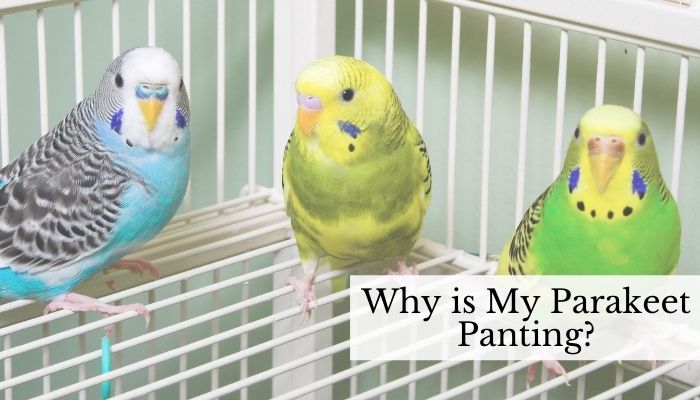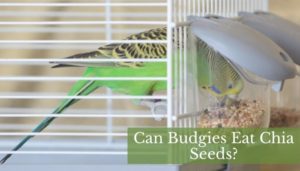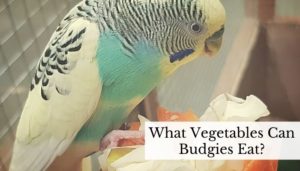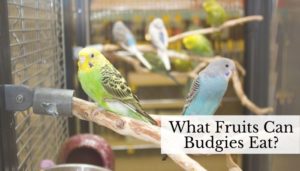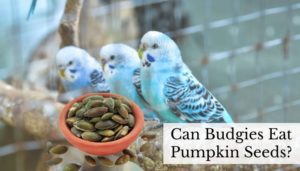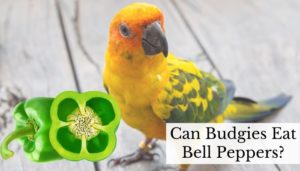For lack of a better word, parakeets make for fascinating pets. A smaller parrot species, parakeets are great “beginner” pet birds that will surely liven up your home with their fun and playful attitude. Think of it as a little 7-year-old that loves to run around, only this time it has wings and chirps instead of talking.
That said, there are plenty of parakeet behavior and habits that may surprise you, especially if you’re coming from a typical house pet like a dog or cat. One such behavior is panting or breathing fast and quickly.
So, with that in mind, why is your parakeet panting? There are many reasons, but the most common cause behind a panting parakeet is that it’s not feeling good. Note that birds don’t always show immediate signs of distress, so if your parakeet is visibly breathing quickly, then it’s a good sign that it’s dealing with some medical issue. In such cases, it’s a good idea to call or visit your trusted vet right away.
Aside from this, there are a few other reasons that may cause your parakeet to start panting, such as when they’re nervous, scared, or reacting to an environmental change.
If you’re eager to learn more and what you can do in such cases, then this article will go over everything you need to know about why your parakeet is panting. Let’s take a closer look.
Why is My Parakeet Panting?
Provided that you take good care of your parakeet and give it a safe living space alongside a healthy diet, then this shouldn’t be a common occurrence at all. However, if you notice that your pet parakeet is breathing fast, then there’s a bit chance that it’s because they’re feeling sick.
For example, when the breathing seems laborious compared to normal, that’s a good indicator of your pet bird feeling unwell or extreme stress. Of course, neither is good and such is the time to take them to a licensed professional, like a veterinarian.
Sometimes, a parakeet may start panting if it’s reacting to a rise in temperature. In this case, your parakeet is most likely panting to control its temperature and not suffer from a heat stroke.
If it’s not overheating, your bird may also show other signs of distress, such as agitation, lethargy (refusal to eat food), or even shivering. In such cases, a veterinarian should adequately check your pet and make a proper assessment, like if your parakeet is suffering from a respiratory condition.
Additional reading: Why is My Budgie Puffed Up and Sleepy?
How Can I Tell That My Parakeet is Having Trouble Breathing?
Most of the time, your parakeet won’t just start panting. Instead, it will also exhibit some behavior that you can watch out for, including:
Tail bobbing up and down
Unlike us, birds don’t have diaphragms, which means their lungs stay open the whole time. This means that if they can’t correctly breathe, they won’t use chest muscles and will often resort to using their posteriors to push air inside. When this happens, their tail will rapidly bob up and down, and it’s a serious indicator that your bird needs medical help.
Breathing with an open mouth
Another indicator that your bird is unwell is if they’re breathing with their mouths open. This is usually because of clogged nares, pushing your bird to take air through its mouth instead. Often, this is a sign of a severe infection.
Voice Change and Coughing
Spending time with your pet familiarizes you with the sound of its voice. So, if you notice that its chirps sound different alongside coughing, it’s an indicator that it has difficulty breathing. It’s also a sign of congestion and lung irritation.
Gasping
Much like humans, a parakeet that is starting to gasp and wheeze instead of regular breathing means that it needs serious help. By contrast, a healthy parakeet makes little to no sound at all while breathing.
Nasal Discharge
Alongside panting, you might notice some nasal discharge from its nares. It would be best if you also watched out for a condition called cyanosis, which is characterized by a bluish tone in the skin. This is a sign of oxygen deprivation, and immediate veterinary help is needed to get your parakeet back to normal.
Additional reading: What Vegetables Can Budgies Eat?
What To Do if Your Parakeet is Panting?
Once you have taken your pet to a specialist and received a proper assessment, there are plenty of things you can do to help your parakeet recover, aside from giving it any prescribed medications. This includes:
Keep your parakeet in an ideal environment
Aside from sickness, a parakeet may also start panting if it gets too hot. In this case, putting its cage in a room where it is neither too hot nor too cold will be ideal. If necessary, you can also provide fans or some natural ventilation. Of course, make sure its water is fresh and clean as well.
Ensure your bird gets the proper amount of rest
Rest is essential for a recovering parakeet, especially if it went through some breathing problems. As such, your pet must get undisturbed sleep for 10 to 12 hours every day. During such times, it’s essential to keep the house peaceful and free from any disturbances, like a pet cat or dog.
Feed your bird a healthy diet, especially high-moisture content
Aside from fresh and clean water, you can also provide fluids to your pet by feeding it high-moisture content like fruits and leafy greens. Of course, this is taking into account that you’re also feeding it a varied diet consisting of pellets, seeds, and fruits/vegetables. Even if they’re not sick, giving your pet a healthy diet is incredibly important.
Ask your vet for a recovering feeding plan
Depending on what your parakeet is going through, this feeding plan will vary. Some may ask you to focus on more vegetables, while others may prescribe medicine alongside the food. Either way, following this recommended feeding plan is instrumental in your parakeet’s recovery.
As your pet recovers, regular check-ups will also go a long way in ensuring it remains healthy.
Final Thoughts
If you’re new to bird-keeping, then you might be surprised that even healthy parakeets can start developing breathing problems, and this doesn’t necessarily mean that you’re doing a lousy job as its owner.
That said, being observant of your parakeet and watching its behavior will go a long way in helping solve any potential health problems before they even begin. In the case of panting, immediate veterinary intervention is required.
Additional reading: How to Tell if Your Bird is Happy
Related Questions
Why is my budgie panting? There are plenty of reasons behind a panting budgie, but the most common causes include sickness, stress, and overheating. If you’re sure that your parakeet isn’t the latter, taking it immediately to a veterinarian to get a proper assessment is highly recommended.
Why is my parakeet shaking? If you notice your parakeet shaking, then it’s likely a sign of stress and anxiety. There are plenty of reasons that can cause this, such as a nearby threat, a new environment, or non-ideal living conditions. Observe your parakeet and its nearby surroundings to find out what’s causing this.
How to calm a stressed parakeet? A stressed parakeet will most likely make noise, fly around the cage in an agitated manner, and start shaking. If this happens, try to move slowly, don’t yell at your bird, and make sure it gets out-of-cage time. Making sure the cage isn’t cramped and giving your pet some toys will also help.
